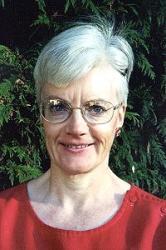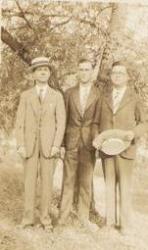
1950 - 2004 Author of "O Lord, Life Is Sacred" in The Cyber Hymnal Born: October 17, 1950, Port Angeles, Washington.
Died: July 23, 2004, Peralta, New Mexico.
Susan was the second of two girls in the family. Her father worked for the National Park Service, so Susan enjoyed growing up in National Parks and Historic Sites across America.
She did her undergraduate work at Stanford University and earned a BS in mathematics in 1972. The next year she took a one-year graduate program at Multnomah School of the Bible in Portland, Oregon, and received a Certificate of Bible upon completion.
She decided not to pursue a career in computer science, as she had originally intended, instead embarking on a series of jobs in which she honed her office skills and gained some missions experience. She spent 1976 in Tanzania under the Africa Inland Mission. Upon her return, she settled in Portland, Oregon, where she learned word processing and did editing and proofreading.
In 1990, Susan decided to go back to school to learn how to work with visually impaired and blind adults. She received her MA in rehabilitation teaching of the blind from the University of Arkansas at Little Rock in 1991. She then moved to Fort Collins, Colorado, where she worked as an editor and desktop publishing technician for 10 years and did volunteer rehabilitation teaching in her spare time. Much of Susan’s editing and desktop publishing work was on books produced by the Missions Commission of World Evangelical Alliance, including Working Your Way to the Nations, Too Valuable to Lose, Send Me!, Global Missiology for the 21st Century, and Doing Member Care Well. She also worked part time for Emergency World, a company that produced training materials for emergency response personnel. Susan moved back to Oregon in 2002, where she continued the same work she did in Colorado.
For several years, Susan worked with Wycliffe Associates as part of a team that helped keyboard Bibles and New Testaments that were printed before the age of computers and that needed to be put into electronic format, so that they could be updated or adapted for other languages.
Susan’s career as a hymn writer began in 1997, when she set a goal of writing 100 hymns. Her method was to select a passage of Scripture for each song and then find a hymn tune that seemed to fit the passage. She thus combined the enduring Word of God with melodies that have stood the test of time. Her songs were a blessing to her, and she was pleased to be able to share them with others.
Lyrics:
Alpha, Omega
Ascribe to the Lord Our God
Be Now Imitators of Your Lord
Be Strong in God
Behold, These Words Are Trustworthy and True
Blest Are the Poor
Blest Is the Man
Christ a Blind Man Saw One Day
Clothe Yourself with Humility
Come and Hear the Words of Jesus
Come unto Me
Count It Joy
Cursed Is the One Who Trusts in Man
Do Not Be Surprised
Do Not Worry
Earth Belongs to the Lord, The
Everyone Should Be Quick to Listen
Faith Means We’re Sure
Faith of Our Brothers
For unto Us a Child Is Born
Give Thanks to God the Lord
God, Keep Me Safe
God Most High, We Praise You
God, the Blessed and Only Ruler
God the Lord Does Ask
Hallelujah, Praise the Lord!
He Has Given Us His Promises
Hear Now My Praise, O Lord
Holy, Holy, Lord God Almighty
How Can I, Lord, Keep My Way Pure?
How Good It Is, Lord
How Great the Love
How Many Are Your Works, Lord
I Am the Lord, Your God
I Am the Vine
I Extol You, O Lord
I Kneel Before You, Lord
I Praise You, Lord
If Any Person Is in Christ
If You Love Me
If You Would Come After Me
In You, O Lord, I Put My Trust
It Is Good to Praise th’Almighty
Jesus, the Good Shepherd
Jonah
Just Trust in Me
Kingdom of Your Heavenly Father, The
Let Not Your Hearts Be Troubled
Let Your Mindset Be the Same
Live with Each Other in Love
Lord, I Extol Your Name
Lord, We Come and Offer Praise
Lord, You Have Been Our Dwelling
Lord, You Have Searched Me
Lord, You’ve Called Us as Your Servants
Love Must Be Sincere and Honest
Lovely, O Lord, Is Your Dwelling Place
Majestic Is Your Name
Man Named Nicodemus, A
My God, in Whom I Trust
My Light and My Salvation
My Soul Finds Rest in God Alone
Now Let Us Love Each Other
Now That You’ve Tasted
O Come, Let Us Sing
O God, You Are My God
O Lord, Life Is Sacred
O Lord, You Reign o’er Earth and Sea
O Lord, You’re My Shepherd
O May All the Peoples Praise You
O Shout for Joy
Oh, How Majestic and Glorious
Oh, the Depth of God’s Wisdom
One Day There’ll Be New Earth and Heaven
One Named Lazarus
Praise Be unto Our God Ephesians
Praise Him, Praise Him, Praise Him
Praise, O Servants of the Lord
Praise the Lord, My Soul
Put Off Your Old Self Wholly
Rejoice in God
Savior, Like a Shepherd
Since Through God’s Mercy
Since We Are Now Surrounded
Since We Have Confidence
Sing to the Lord
Sing with Joy
This God’s Our God
Though I Speak
To Whom Will You Compare God?
Trust in the Lord with All Your Heart
Unto You I Lift My Soul Up
Up to the Hills I Look
We Now Have Peace with God
We Thank You, Lord
Wedding Took Place, A
Well Done, Good and Faithful Servant
What Good Can Come?
What Shall We Say?
Where Can One Look for
--www.hymntime.com/tc
Susan H. Peterson


 My Starred Hymns
My Starred Hymns






